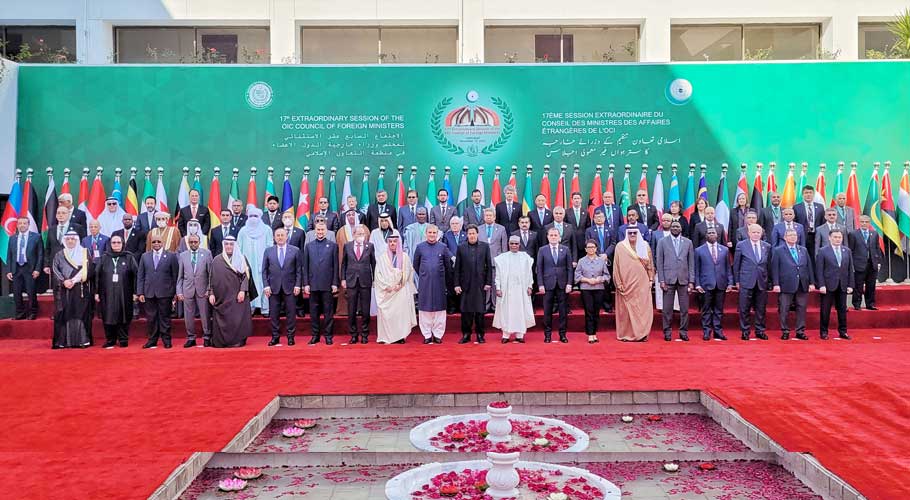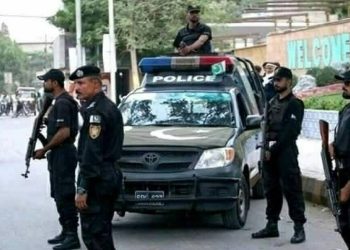ISLAMABAD: The inaugural session of the Organisation of Islamic Cooperation’s (OIC) Council of Foreign Ministers (CFM) to discuss the simmering humanitarian crisis in Afghanistan has concluded at the Parliament House in Islamabad.
The purpose of the OIC meeting is to address the looming humanitarian crisis in Afghanistan and turn the world’s attention to the people of the war-ravaged country, who are at severe risk of starvation and disease.
Envoys from 57 Islamic nations as well as observer delegations are participating in today’s session. Besides OIC Members and Observers, the UN system, International Financial Institutions (IFIs), international and regional organizations, and non-OIC members including the P-5, EU, and major countries like Germany and Japan, are among the other invitees.
Following the recitation of Holy Quran, Foreign Minister Shah Mahmood Qureshi formally declared the extraordinary session “open”. He was the first to address the summit.
“Six-point framework”
Foreign Minister Shah Mahmood Qureshi, in his opening remarks, commended Saudi Arabia for convening the session as OIC chair and trusting Pakistan to host the extraordinary moot. Besides other delegates, he also appreciated the secretary-general of the OIC for rapid mobilisation and arrangements for the session on short notice.

Qureshi proposed a six-point framework for the OIC to lead which included creating a vehicle with the OIC to channel “immediate and sustained humanitarian and financial support to the Afghan government”.
Qureshi also called for enhanced engagement with Afghanistan to bring in political and social inclusivity besides ensuring respect for human rights particularly women’s rights.
The foreign minister also called for increased investments in the education and vocational sectors of Afghanistan, either bilaterally or through the OIC platform.
He also proposed the establishment of an expert group of the OIC and UN officials to revive the banking sector in Afghanistan that collapsed after the Taliban took over Kabul.
‘Economic difficulties could trigger a humanitarian crisis’
Addressing the OIC session, Saudi Minister of Foreign Affairs Prince Faisal bin Farhan Al Saud pointed out that the economic difficulties could trigger a humanitarian crisis and lead to further instability which could impact regional and international peace.

He said that the OIC meeting expressed solidarity with the Afghans and demonstrated to the world the need for immediate action. “The people of Afghanistan have suffered for too long,” he said, adding that they had faced years of instability.
The Saudi minister urged OIC member states to play a part in providing the Afghans with the necessary support and to prevent an economic collapse in the country.
Highlighting the assistance provided by the kingdom in the past, he said that Saudi Arabia had recently airlifted food supplies on the directives of King Salman bin Abdulaziz.
Concluding his speech, he expressed the hope that the OIC meeting would come up with a proper resolution as well as recommendations to alleviate the difficulties being faced by the Afghans.
‘OIC ready to play its role in supporting humanitarian action’
Speaking on the occasion, OIC Secretary-General Hissein Brahim Taha thanked the participants for electing him. He also voiced his appreciation for Saudi Arabia for supporting “Islamic solidarity”, and thanked Pakistan for the cordial welcome.

“By hosting this event, Pakistan reaffirms its total commitment to the issues facing the Muslim community with a keen dedication to security and peace for region and world,” he said.
“The OIC has always taken a strong position which supports its member countries. The joint secretariat calls for the sovereignty, unity and territorial integrity of Afghanistan,” he added.
The OIC secretary-general said that the role of OIC members in delivering humanitarian assistance was more important now than ever before as the pandemic had exacerbated existing challenges.
“We commend the humanitarian assistance provided by some member states to the Afghan people. We also call for all parties concerned to cooperate with the OIC mission in Kabul to provide relief to the affected Afghan people,” he said.
“The OIC is ready to carry out a follow-up of the outcome and to play its role in supporting humanitarian action in coordination with the relevant OIC missions and relief agencies across the Muslim world,’ he concluded.
Extraordinary session
Pakistan has time and again emphasised that the lack of prompt response would lead to food shortages for some 22.8mn people and affect about 3.2mn children with malnutrition.
“The OIC Extraordinary session in Islamabad would prove to be a stepping stone in finding solutions to the humanitarian crisis in Afghanistan and this was also an opportunity for world capitals to know about ground realities from Taliban representatives,” said Foreign Minister Shah Mahmood Qureshi earlier.
“In case of such a crisis, the country’s neighbours, including Pakistan, and European Union states, would have to prepare for another influx of refugees. We are expecting some financial support from the OIC member states.”
Later a meeting of the Troika Plus – comprising Pakistan, China, Russia and the United States — P5 countries and Germany, Japan, Italy and Australia would also be held in Islamabad to discuss the Afghan situation. The moot was proposed by Saudi Arabia last month, following which Pakistan had welcomed the move and offered to host the session.





































